
United Nations Security Council resolution 819, adopted unanimously on 16 April 1993, after reaffirming resolutions 713 (1991) and all (1992) subsequent resolutions, the Council expressed concern at the actions of Bosnian Serb paramilitary units in towns and villages in eastern Bosnia and Herzegovina, including attacks on civilians, the United Nations Protection Force and disruption to humanitarian aid convoys. The resolution marked the UN's first civilian "safe area" being declared; it failed to prevent the Srebrenica massacre.

United Nations Security Council resolution 724, adopted unanimously on 15 December 1991, after reaffirming resolutions 713 (1991) and 721 (1991) and noting a report by the Secretary-General Javier Pérez de Cuéllar on the situation in the Socialist Federal Republic of Yugoslavia, the council agreed to carry forward proposals for a planned peacekeeping operation in Yugoslavia and decided to establish a committee of the Security Council to consider matters relating to the arms embargo on the country.
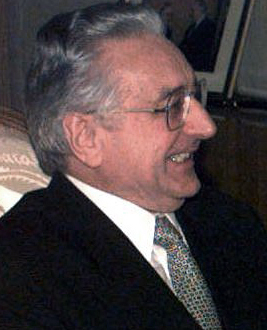
United Nations Security Council resolution 740, adopted unanimously on 7 February 1992, after reaffirming resolutions 713 (1991), 721 (1991), 724 (1991) and 727 (1992) and considering a report by the Secretary-General Boutros Boutros-Ghali, the Council approved plans for a peacekeeping mission in the Socialist Federal Republic of Yugoslavia.
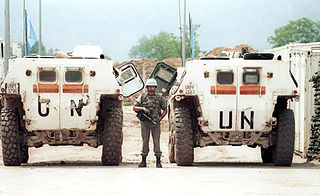
United Nations Security Council resolution 743, adopted unanimously on 21 February 1992, after reaffirming resolutions 713 (1991), 721 (1991), 724 (1991), 727 (1992) and 740 (1992), and considering that the situation in the Socialist Federal Republic of Yugoslavia constituted a threat to international peace and stability, the council established a peacekeeping mission in the country, known as the United Nations Protection Force (UNPROFOR), with the aim of reaching a peaceful political settlement in the region.

United Nations Security Council resolution 758, adopted unanimously on 8 June 1992, after reaffirming resolutions 713 (1991), 721 (1991), 724 (1991), 727 (1992), 740 (1992) 743 (1992), 749 (1992), 752 (1992) and 757 (1992), the council, in accordance with a report by the Secretary-General Boutros Boutros-Ghali, decided to enlarge the mandate and strength of the United Nations Protection Force (UNPROFOR) in former Yugoslavia.

United Nations Security Council resolution 762, adopted unanimously on 30 June 1992, after reaffirming resolutions 713 (1991), 721 (1991), 724 (1991), 727 (1992), 740 (1992) 743 (1992), 749 (1992), 752 (1992), 757 (1992), 758 (1992), 760 (1992) and 761 (1992), the Council urged all parties to honour their commitments to the United Nations plan in former Yugoslavia and complete a cessation of hostilities.

United Nations Security Council resolution 787, adopted on 16 November 1992, after reaffirming Resolution 713 (1991) and all subsequent resolutions on the topic, the council called upon the parties in Bosnia and Herzegovina to consider the draft outline constitution as a basis for negotiating a political settlement of the conflict in the country, and went on to impose further international sanctions on the Federal Republic of Yugoslavia.
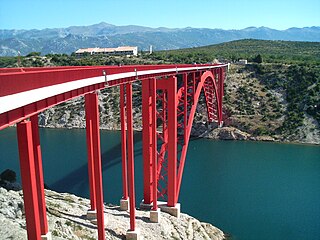
United Nations Security Council resolution 802, adopted unanimously on 25 January 1993, after reaffirming Resolution 713 (1991) and all subsequent relevant resolutions and expressing its concern at offensives by the Croatian Army in the United Nations Protected Areas, the council demanded the immediate cessation of hostilities and the withdrawal of Croatian forces from the areas.

United Nations Security Council resolution 816, adopted on 31 March 1993, after reaffirming resolutions 781 (1992), 786 (1992) concerning a ban on military flights over Bosnia and Herzegovina and recognising the current situation in the region, the council, acting under Chapter VII of the United Nations Charter, extended the ban to cover flights by all fixed-wing and rotary-wing aircraft over the country, and to use all measures necessary to ensure compliance with the ban.

United Nations Security Council resolution 820, adopted on 17 April 1993, after reaffirming all previous resolutions on the topic for a lasting peace settlement in Bosnia and Herzegovina and the region, the council discussed the peace plan for Bosnia and Herzegovina and comprehensive steps to ensure its implementation.

United Nations Security Council resolution 827, adopted unanimously on 25 May 1993, after reaffirming Resolution 713 (1991) and all subsequent resolutions on the topic of the former Yugoslavia, approved report S/25704 of Secretary-General Boutros Boutros-Ghali, with the Statute of the International Tribunal as an annex, establishing the International Criminal Tribunal for the former Yugoslavia (ICTY).
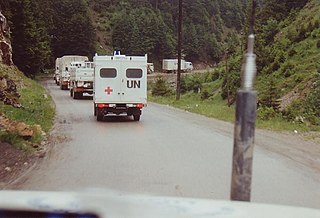
United Nations Security Council resolution 836 was adopted on 4 June 1993. After reaffirming Resolution 713 (1991) and all subsequent resolutions on the situation in the former Yugoslavia, the Council expressed its alarm at the continuing situation in Bosnia and Herzegovina and decided to expand the mandate of the United Nations Protection Force (UNPROFOR) by allowing it to use force to protect the "safe areas".

United Nations Security Council resolution 859, adopted unanimously on 24 August 1993, after recalling all resolutions on the situation in Bosnia and Herzegovina, the council noted that, despite all previous security council resolutions since Resolution 713 (1991), the region was still a scene of hostilities and there was little compliance with previous resolutions, particularly by the Bosnian Serb party.

United Nations Security Council resolution 942, adopted on 23 September 1994, after reaffirming all resolutions on the situation in Bosnia and Herzegovina, the Council reinforced measures relating to safe areas under control of Bosnian Serb forces.
United Nations Security Council resolution 987, adopted unanimously on 19 April 1995, after reaffirming all resolutions on the conflicts in the former Yugoslavia, in particular Resolution 982 (1994), the Council called for measures to ensure the safety, security and freedom of movement of the United Nations Protection Force (UNPROFOR) in Bosnia and Herzegovina following attacks on it.

United Nations Security Council resolution 998, adopted on 16 June 1995, after reaffirming all resolutions on the conflicts in the former Yugoslavia, in particular Resolution 982 (1994), the council established a rapid reaction force of up to 12,500 personnel within the United Nations Protection Force (UNPROFOR) in Bosnia and Herzegovina following attacks on it and the overall deteriorating situation.
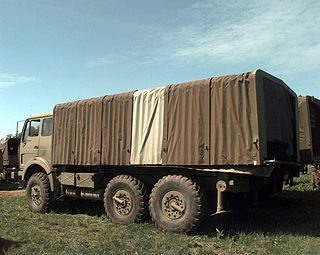
United Nations Security Council Resolution 1021, adopted on November 22, 1995, after recalling all resolutions on the situation in the former Yugoslavia, particularly resolutions 713 (1991) and 727 (1992), the Council set a date of March 13, 1996, for the suspension of most aspects of the arms embargo on the former Yugoslavia. Resolution 1074 (1996) terminated the remaining measures of the embargo.

United Nations Security Council resolution 1199, adopted on 23 September 1998, after recalling Resolution 1160 (1998), the Council demanded that the Albanian and Yugoslav parties in Kosovo end hostilities and observe a ceasefire.
The Vance plan was a peace plan negotiated by the former United States Secretary of State Cyrus Vance in November 1991 during the Croatian War of Independence. At that time, Vance was the Special Envoy of the Secretary-General of the United Nations; he was assisted by United States diplomat Herbert Okun during the negotiations. The plan was designed to implement a ceasefire, demilitarize parts of Croatia that were under the control of Croatian Serbs and the Yugoslav People's Army (JNA), allow the return of refugees, and create favourable conditions for negotiations on a permanent political settlement of the conflict resulting from the breakup of Yugoslavia.

Democratic Federal Yugoslavia was a charter member of the United Nations from its establishment in 1945 as the Socialist Federal Republic of Yugoslavia until 1992 during the Yugoslav Wars. During its existence the country played a prominent role in the promotion of multilateralism and narrowing of the Cold War divisions in which various UN bodies were perceived as important vehicles. Yugoslavia was elected a non-permanent member of the United Nations Security Council on multiple occasions in periods between 1950 and 1951, 1956, 1972–1973, and 1988–1989, which was in total 7 years of Yugoslav membership in the organization. The country was also one of 17 original members of the Special Committee on Decolonization.
















